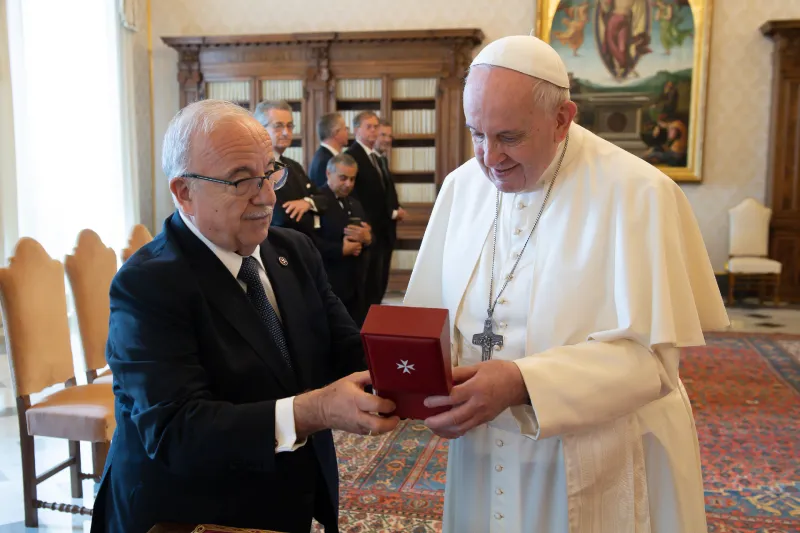 Pope Francis meets with the Order of Malta’s Fra’ Marco Luzzago on June 25, 2021. / Vatican Media
Pope Francis meets with the Order of Malta’s Fra’ Marco Luzzago on June 25, 2021. / Vatican Media
Vatican City, Oct 27, 2021 / 05:30 am (CNA).
As the Order of Malta continues its reform process, Pope Francis has empowered a special delegate to determine when and how the nearly 1000-year-old order’s next Grand Master will be elected.
Pope Francis sent a letter to Cardinal Silvano Maria Tomasi this week granting him the ability to convene the full Council of State for the election of a new Grand Master and convoke the next Extraordinary General Chapter at a date of his choosing.
“In order to be able to continue this important work of renewal, as my special delegate you have all the powers necessary to decide any questions that may arise in the implementation of the mandate entrusted to you,” Pope Francis wrote in the letter to Cardinal Tomasi signed on Oct. 25.
“As my special delegate, you have the power to take upon yourself aspects of the ordinary government of the Order, even derogating, if necessary, from the current Constitutional Charter and the current Codex Melitense, as well as to resolve all internal conflicts within the Order ex auctoritate Summi Pontificis.”
Pope Francis appointed Cardinal Tomasi as his special delegate to oversee the reform of the Sovereign Military Order of Malta in November last year after the resignation of Cardinal Angelo Becciu.
Within a week of Tomasi’s appointment, the Order of Malta elected Fra’ Marco Luzzago as the Lieutenant of the Grand Master to serve a one year term.
In his letter, Pope Francis extended Fra’ Marco Luzzago’s term indefinitely until the election of a new Grand Master, a position that is traditionally held for life.
“It is important that the Extraordinary General Chapter be celebrated in conditions that will ensure the necessary renewal in the life of the Order,” the pope wrote.
Pope Francis thanked Tomasi for “the positive steps taken in the spiritual and moral renewal of the Order” in the past year since his appointment, especially with regard to the order’s professed members and updating its constitution.
His letter outlined five specific powers which the cardinal will have if any problems arise in planning the Extraordinary General Chapter.
Among them is the power to approve the Constitutional Charter and the Codex Melitense and to to “proceed with the renewal of the Sovereign Council in accordance with the new regulatory texts.”
“I have no doubt that the entire Order, at every level, will willingly collaborate with you in a spirit of authentic obedience and respect,” he added near the end of the letter.
The Order of Malta welcomed the pope’s decision in a statement shared with CNA on Oct. 26.
“The Order of Malta is convinced that Pope Francis’ decision will accelerate the process of reform of the Constitutional Charter and Code, enabling the Order to elect a Grand Master in the near future, and to continue its mission of service to the poor and the sick,” it said.
Founded in Jerusalem in the year 1048, the Sovereign Order of Malta today operates mainly in the field of medical and humanitarian assistance as a primary body of international law and a lay Catholic religious order.
The order has faced a slow-moving constitutional crisis since Pope Francis compelled the resignation of a previous Grand Master, Fra’ Matthew Festing in 2017.
That decision came after Festing himself had compelled the resignation of Grand Chancellor Albrecht Freiherr von Boeselager Boeselager in 2016, after it became known that an aid project of the order in Myanmar had distributed thousands of condoms. Boselager insisted that he had not known about the distribution of condoms, and that he had put a stop to it as soon as he became aware.
In 2017, Boeselager was reinstated as Grand Chancellor, and Becciu was appointed as the pope’s personal delegate to oversee the order’s reform, effectively supplanting the role of the order’s Cardinal Patron, Cardinal Raymond Burke, who remains in post only nominally.
As part of its reform, the Order of Malta has considered changes to the office of Grand Master itself, and the role of the first degree of professed knights – those who make perpetual religious vows – in the governance of the order, as opposed to the second and third degrees, who do not.
Today the Order of Malta, with its 13,500 members, 80,000 volunteers, and its staff of 42,000 professionals, has a mission of witnessing the faith and serving the poor and the sick. The Order manages hospitals, medical centers, clinics, institutions for the elderly and disabled, centers for the terminally ill, volunteer corps, and has a relief agency, Malteser International.
Since 1834 the seat of the Government of the Sovereign Order of Malta has been in Rome, where it has guarantees of extraterritoriality.
The Order of Malta has bilateral diplomatic relations with 110 states, official relations with six other states, ambassadorial relations with the European Union and is a permanent observer to the United Nations and its specialized agencies.

[…]





